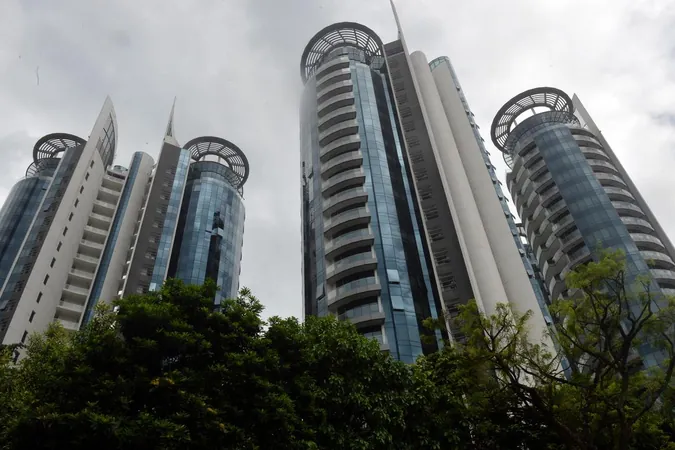
Singapore's Luxury Condo Market Hits a Snag in 2024: Is Foreign Investment Dwindling for Good?
2025-01-29
Author: John Tan
Luxury Condo Market Overview
The luxury condominium market in Singapore has sharply slowed down in 2024, with property agents lamenting a significant drop in potential buyers, particularly from overseas. Despite over 200 luxury condo listings priced above $10 million in the affluent Orchard area, many properties remain unsold, repetitively listed by multiple agents, further complicating the market dynamics.
Impact of Additional Buyer's Stamp Duty (ABSD)
The downturn in foreign buyer interest is largely blamed on the heavy 60% Additional Buyer's Stamp Duty (ABSD) implemented in April 2023, which has drastically cut the volume of international investments in high-end properties. Analysts indicate that a combination of this regulatory change, along with a restricted supply of new luxury homes in 2024, has left real estate agents struggling to close deals.
Transaction Statistics and Historical Context
To illustrate, only 21 luxury condo units in the core central region (CCR) exchanged hands for over $10 million in 2024. This marks a steep decline compared to 36 units sold in 2023 and 56 in 2022. The situation is a stark contrast to 2021 when resales surged to 100 luxury condos, or the record-setting $62 million penthouse sale at Wallich Residence in 2020.
Market Trends and Buyer Preferences
This year’s biggest transaction was a 5,801 sq ft unit at Eden Residences Capitol that fetched $19.75 million. This is a far cry from last year's top deal, a penthouse at Goodwood Residence sold for $32 million to a Singapore permanent resident of Chinese origin. Christine Sun, senior vice-president of research and analytics at OrangeTee & Tie, elaborates, 'The decreased number of transactions can primarily be attributed to the decline in demand from foreign buyers, who have been significantly impacted by the 60% ABSD.'
Tax Implications for Foreign Buyers
This legislation presents a complicated landscape: while Singapore citizens face a 20% ABSD on their second property and permanent residents only pay 5% on their first, foreign buyers are hit hard with the maximum rate. Meanwhile, restrictions on foreign purchases of landed homes in Singapore have led high-net-worth individuals to opt for luxury condos, making the tax hike even more impactful.
Shifts in Local Buyer Interests
Nicole Teo, deputy branch associate director of OrangeTee & Tie, pointed out that Singaporeans, especially those with considerable funds to invest, usually prefer landed properties over high-rise condominiums. 'A Singaporean looking to invest $20 million would rather find a high-quality landed home instead of a condo,' she stated, reinforcing the shift in buyer preferences.
Challenges for Real Estate Agents
As the luxury condo market grapples with these challenges, agents continue to navigate the complexities of arranging property viewings. Stefanie Wong of Singapore Realtors Inc. mentioned it often takes weeks or even months to schedule viewings with existing tenants hindering the sales process. Additionally, with some properties remaining on the market for several months, it hints at a cooling demand among high-net-worth investors who are particularly cautious about entering this uncertain market.
Local Buyers Take the Lead
Alex Low, a specialist in Sentosa Cove properties, noted a notable trend where most sales are now being driven by Singaporean buyers, with only a handful of foreign investors circumventing the heavy tax burden. In 2024, 132 condos were resold in the exclusive Sentosa enclave, with 62% of transactions attributed to The Residences at W Singapore Sentosa Cove. This shift suggests a potential spillover of demand for luxury homes as buyers turn towards areas where prices are comparatively lower.
Market Resilience and Rental Growth
Despite these hurdles, there are silver linings. The Urban Redevelopment Authority (URA) reported a slight increase in median rents for non-landed properties in the CCR, rising from $5.50 per sq ft in mid-2024 to $5.57 in the last quarter. Tenants are being drawn back to prime areas, leading to hopes for steady rental growth, making it a potential focal point for certain investors seeking future rental income.
Conclusion: Future of the Luxury Condo Market
In conclusion, while 2024 makes it clear that Singapore's luxury condo market is experiencing significant strain from diminishing foreign buyer interest and heavy regulatory burdens, a resilient core of local investors and potential for rental recovery suggest that the market is merely at a crossroads rather than a complete standstill. As the dynamics evolve, the question remains: can Singapore's luxury real estate sector rebound, or is this a sign of a longer-term shift?


 Brasil (PT)
Brasil (PT)
 Canada (EN)
Canada (EN)
 Chile (ES)
Chile (ES)
 Česko (CS)
Česko (CS)
 대한민국 (KO)
대한민국 (KO)
 España (ES)
España (ES)
 France (FR)
France (FR)
 Hong Kong (EN)
Hong Kong (EN)
 Italia (IT)
Italia (IT)
 日本 (JA)
日本 (JA)
 Magyarország (HU)
Magyarország (HU)
 Norge (NO)
Norge (NO)
 Polska (PL)
Polska (PL)
 Schweiz (DE)
Schweiz (DE)
 Singapore (EN)
Singapore (EN)
 Sverige (SV)
Sverige (SV)
 Suomi (FI)
Suomi (FI)
 Türkiye (TR)
Türkiye (TR)